Unveiling the Symptoms of Being 6 Weeks Pregnant
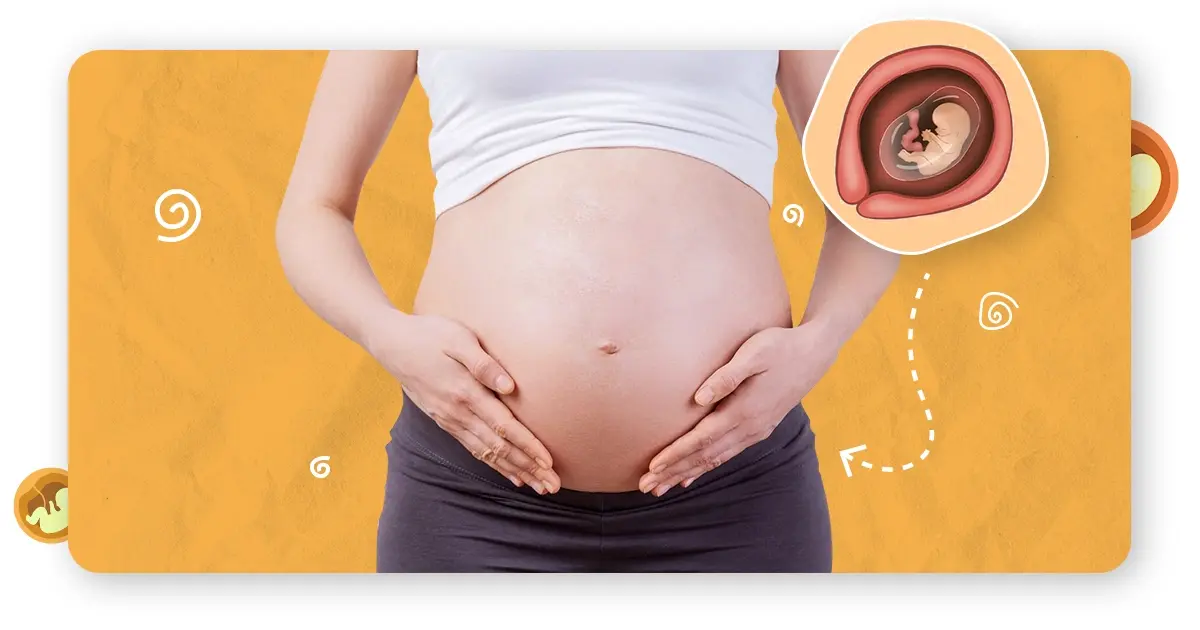
If you’re now in your sixth week of pregnancy you would have likely found out…
If you’re now in your sixth week of pregnancy you would have likely found out about it just a week or two earlier. And you might have already started experiencing a few pregnancy symptoms. Here we will be explaining some common symptoms of being 6 weeks pregnant.
The pregnancy period is a surreal experience for new moms-to-be when they’re excited to welcome their precious newborn but are also nervous about the newness of it.
Becoming aware of these symptoms and learning how to manage them can turn your pregnancy journey comfortable and enjoyable. So, are you eager to learn more about 6 weeks of pregnant symptoms? If yes, stay with us until the end of this highly informative post.
Changes in the Body
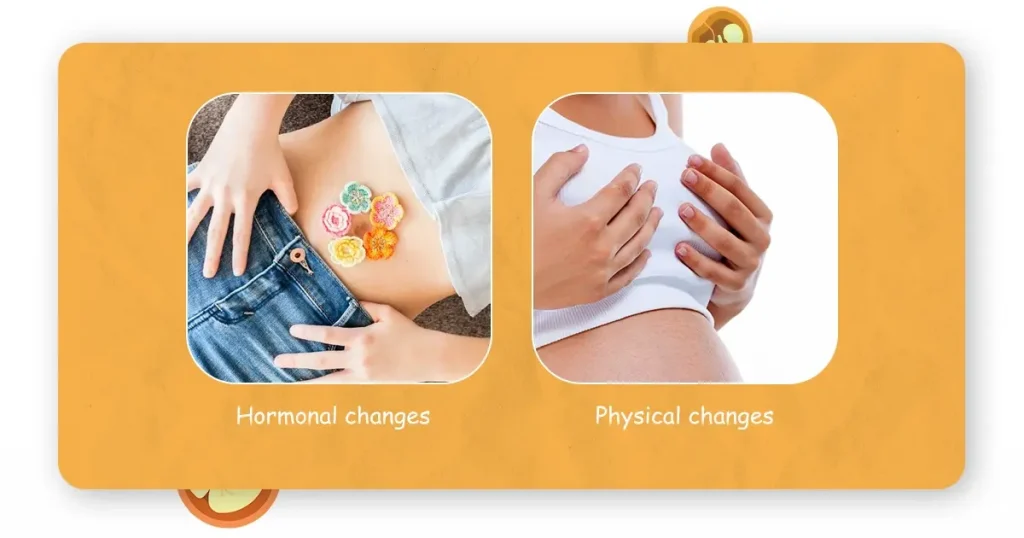
Hormonal Changes
As soon as you conceive, your body sees a surge in hormonal levels. Pregnancy hormones like progesterone, estrogen, and hCG begin rising to prepare the body so it can support your baby’s optimal growth. It’s mainly because of these three hormones that you start feeling all those not-so-pleasing pregnancy symptoms.
These symptoms can make you feel different than you normally do and hence, may need you to bring in some significant changes to your lifestyle. So now you know why you have been having those nasty mood swings all day! But don’t you worry! These symptoms usually mellow down when you enter your second trimester, which is the most comfortable phase in any pregnancy.
Physical Changes
1. Tender Breasts and Nipple Sensitivity
One of the most prominent symptoms you will be dealing with when you’re 6 weeks pregnant is swollen and tender breasts, along with nipple sensitivity. It means that even a slight touch or brush against your breasts will be painful. You may sometimes even develop a tingling feeling as your body increases blood supply to your breasts so it gets ready for something very important, and that is breastfeeding your baby!
2. Fatigue and Increased Need For Rest
This is the time when you’ll need to hit the sack more often because you may find that even after doing a few light chores, you feel exhausted. As your body works hard to nourish your growing fetus, it is no surprise that your need to take breaks will go up. So don’t be too harsh on yourself. Take frequent breaks if you are working or take a nap if possible so you can get some of your energy back.
3. Nausea and Morning Sickness
Have you already started feeling queasy yet? If not, you may experience it soon. From your 6th to 10th week (for some, even beyond), you have higher chances of feeling nausea and vomiting. The hormone human gonadotropic hormone (hCG) is believed to cause this symptom. Reports suggest 70-80% of pregnant women deal with this unpleasant pregnancy symptom. So, if you begin showing these symptoms, remember you’re not alone! But if it gets tough for you to manage your discomfort, ask your doctor for help.
4. Increased Urination Frequency
Soon after you conceive, you may often notice yourself going to the bathroom. This increased urge to pee results from increased blood flow to your pelvic region and the fact that your kidneys have now begun to remove waste from your body more efficiently. In addition, your uterus is now growing bigger and better to accommodate your baby, which puts pressure on your urinary bladder. These changes will make you pee more often during the day and may even wake you up at night several times.
5. Changes in Appetite and Food Cravings
As your baby grows, you will be surprised to see how your diet and appetite go through a drastic change. You may find yourself eating for two because you might feel hungrier than you used to. Foods you didn’t even look at earlier can now become cravings, while your favorite foods could be the last thing on your mind when you are hungry.
6. Bloating and Constipation
Thanks to progesterone, one of the essential pregnancy hormones, some of you might feel bloated during your early pregnancy. When progesterone levels rise in your body, your digestive tract becomes sluggish. It generates more gas than usual, leaving you bloated. Plus, all those iron tablets you have been taking can also put you at risk of getting constipated.
Changes in the Baby
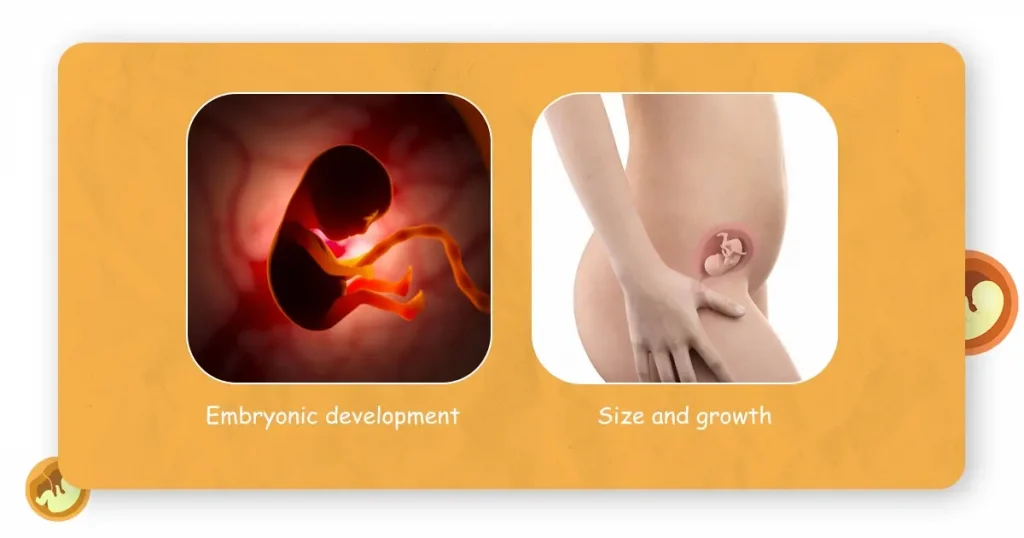
Embryonic Development
Learning how your baby is growing week after week is so interesting! After the symptoms of being 6 weeks pregnant, your little one is about 5-6 mm long. But that does not mean nothing much is happening. There are a lot many developments going on in your tiny fetus. You will be happy to know that your baby’s heart starts beating at 6 weeks.
The neural tube, which begins to grow at the 3rd – 4th-week post-conception, will now close entirely and turn into your baby’s brain and spinal cord. You can see the appearance of limb buds, which gradually turn into your baby’s legs and arms. There are tiny dimples where the ears will be and visible nodes that later turn into the baby’s eyes.
There’s also a thin layer of translucent skin covering the baby. If you’re wondering about other organ systems, let us tell you that the reproductive, urinary, and digestive systems start developing around this time. However, they are still in the very early stages of growth.
Size and Growth
Your baby is now around 1/4th inch in length from the crown to the rump. That means it is the size of a rice grain with the silhouette of a baked bean. Isn’t that cute? Since your baby is so tiny, you won’t notice your baby bump any time soon. But even though the size may seem insignificant, a lot of growth is happening there. The embryo undergoes rapid cell division every day and creates the foundation for the development of vital organs and systems.
Emotional and Psychological Symptoms
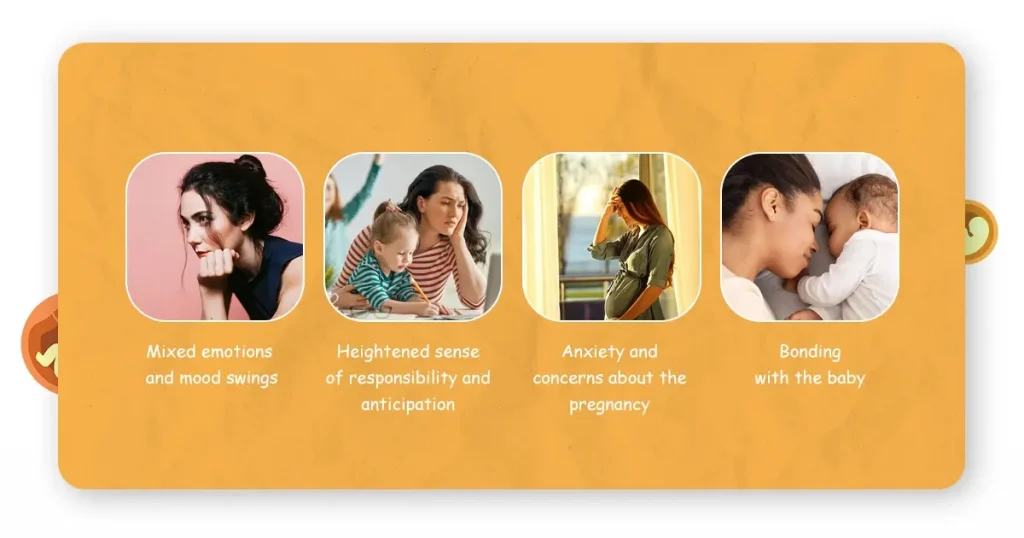
Mixed Emotions and Mood Swings
Bringing a baby into this world is a huge responsibility. So it is okay if you have mixed emotions about this. Many women face this feeling of being happy, stressed, and overwhelmed at the same time. 6 weeks pregnant symptoms are too early to let this big news sink in while you are dealing with mood swings and other not-so-pleasant feelings. So, give yourself some time and let it all settle.
Heightened Sense of Responsibility and Anticipation
With your baby comes huge responsibility. As you realize it’s all happening, you will feel a sense of responsibility toward your growing baby. While you are filled with eagerness and anticipation, you will want to take care of yourself so you’re prepared to look after your baby after birth and provide for their needs.
Anxiety and Concerns About the Pregnancy
Anxiety is another distressing symptom you can experience at 6 weeks. Many women experience anxiety, especially the ones who have been trying to conceive for a long time. Thoughts and concerns about their pregnancy can leave them stressed and anxious because all they wish for is a safe, happy, and healthy pregnancy. A little concern is not a problem, but if your anxiety is affecting you negatively, you must speak to your physician for support.
Bonding with the Baby
Now that you know there’s a life growing inside your tummy, you may want to bond with your baby. Many women feel an instant connection with their babies, while others need time to feel the bond. Either of the situations is okay. So, talk to your baby, sing them songs, rub your tummy more often, or gently massage it. Your baby may not be able to sense it all yet, but it will surely help build a strong mommy and baby connection.
Coping with the Symptoms
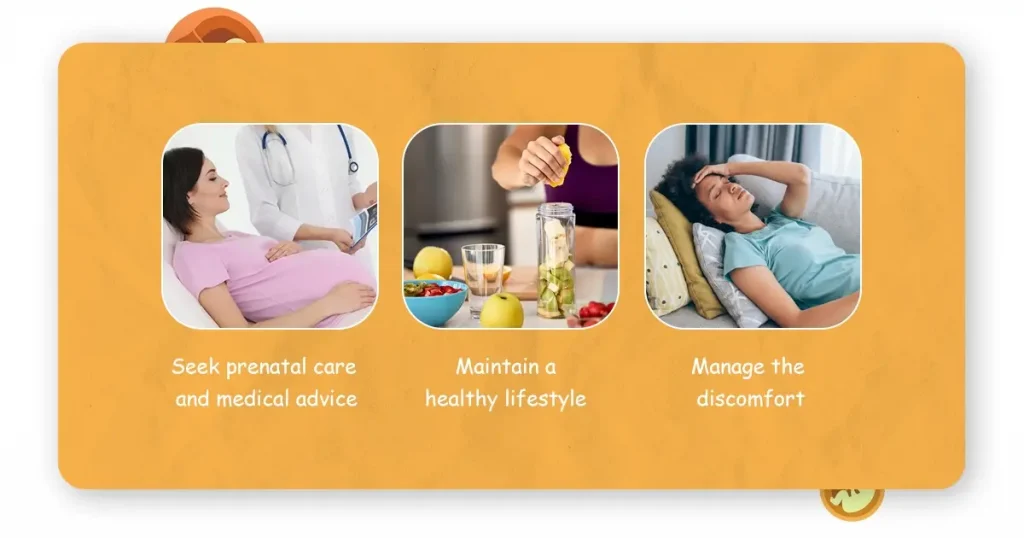
Seek Prenatal Care and Medical Advice
Pregnant women experience different symptoms at different stages of pregnancy. Not all women experience the same symptoms to the same degree. Some have mild discomfort, and then we have others who have a hard time managing their symptoms. Either way, whenever you have a symptom coming up, discuss it with your OB/gyn. They are the right people to guide you on prenatal care and give you appropriate advice to manage your symptoms depending on your condition.
Maintain a healthy lifestyle
If you want to deal with your pregnancy symptoms effectively, you must incorporate a few things into your routine. Let’s see what they are:
Have a Balanced Diet: A diet full of fruits, veggies, protein, grains, and dairy is what you need when eating for two. Try to add lots of fiber-rich foods to help with constipation.
Take your Prenatal Vitamins Regularly: You may feel a little uneasy when you first begin taking your vitamins, especially iron tablets. However, this will improve as your body gets used to this new intake.
Get Some Physical Activity: You may be tired during this period of your pregnancy, but try to do some light exercise, like walking every day. But don’t push yourself off limits when you’re tired. Try to meet this daily goal only if your body permits.
Get Sufficient Rest: Relax and rest whenever you feel like it. Your body is busy doing that extra work, so resting is now more important than ever. If your work involves standing, take breaks from time to time and sit down to give those tired feet some rest. You may even consider taking a short nap to refresh your lost energy.
Manage the Discomfort
Morning sickness and constipation are probably the worst symptoms you have, which cause a lot of discomfort during the first few weeks. Thankfully, all these issues are manageable if you take the right approach.
Drink plenty of water and eat healthy, non-spicy foods if you have these issues, including heartburn, indigestion, or bloating. Try natural remedies like ginger tea, peppermint aromatherapy, or smell a freshly sliced lemon if you’re queasy. Learn acupressure techniques to help yourself when you are hit with nausea and vomiting.
Tired of all the home remedies you’ve been trying with no success? It may be time to bring things to your doctor’s notice so he can offer support and prescribe medications that can fix your issues.
Concluding Thoughts
After knowing the symptoms and what you can go through at 6 weeks of pregnancy, you may have gotten an idea of how it will be. There may be times when you feel low due to all the bizarre symptoms you have been experiencing, but try to remain positive. Your baby needs a stress-free and happy mama.
Embrace self-care and make it a priority to feel better. Get support from your partner, family, or friends, and seek medical advice when necessary. Gather your patience and try to stay calm. As time goes by, you will soon be in your second trimester, which will be far better than the first one. So stay positive and take care, mama!
FAQs
Symptoms such as morning sickness, bloating, constipation, tender breasts, frequent urination, fatigue, and food cravings are pretty common during the sixth week of pregnancy.
Yes, it is normal to feel tired when you’re six weeks pregnant because your body is busy working to create a new life.
Yes, morning sickness is a prevalent symptom at 6 weeks of pregnancy. However, it is not restricted to the mornings and can happen anytime during the day.
Yes, breast tenderness and enlargement are one of the first signs of pregnancy. It occurs quite commonly in pregnant women and is present at 6 weeks.

